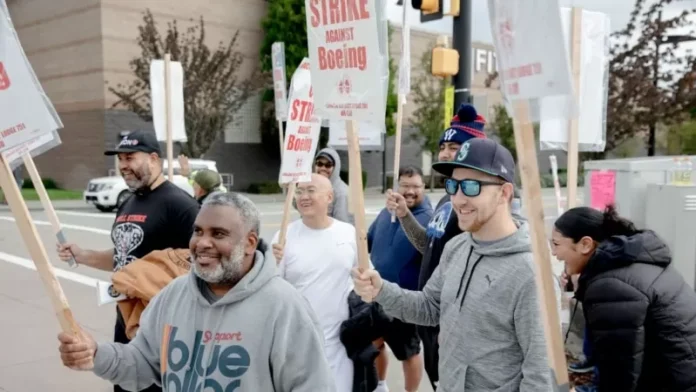New York – Boeing, one of the world’s leading aerospace companies, announced on Wednesday that it would be implementing temporary furloughs for its professional and white-collar staff in an effort to conserve cash during a labor strike that has resulted in the closure of its Seattle manufacturing plants.
According to company officials, the furloughs will affect tens of thousands of employees and will be implemented in the coming days. The move comes as a result of the ongoing strike by the International Association of Machinists and Aerospace Workers District 751, which began on Friday after the rejection of a contract renewal.
Boeing’s new CEO, Kelly Ortberg, stated that the company plans for “selected employees to take one week of furlough every four weeks on a rolling basis for the duration of the strike.” In addition, Ortberg and the rest of the leadership team have also committed to taking a pay reduction for the duration of the strike.
Earlier this week, Boeing had announced a hiring freeze, travel budget austerity measures, and a reduction of supplier expenditures as part of its efforts to mitigate the financial impact of the strike.
Negotiations between the two sides resumed on Tuesday with the assistance of mediators from the Federal Mediation and Conciliation Service. However, the IAM has expressed frustration with Boeing’s lack of preparedness and unwillingness to address key issues such as wages and pensions.
In a bargaining update posted late Tuesday, the IAM stated, “The company was not prepared and was unwilling to address the issues you’ve made clear are essential for ending this strike: Wages and Pension. The company doesn’t seem to be taking mediation seriously.”
Despite the challenges posed by the strike, Ortberg reassured employees in a message that the company remains committed to finding a resolution and “resetting our relationship with our represented employees.” He also emphasized the importance of reaching a new agreement that is beneficial for all employees and the company as soon as possible.
The strike has caused disruptions in the production of Boeing’s commercial airplanes, including the 737 MAX, which has been grounded since March due to safety concerns. The company is also facing financial pressure from the ongoing trade war between the United States and China, one of its biggest customers.
Boeing’s decision to implement furloughs is a necessary step to ensure the company’s long-term financial stability. However, it is also a difficult one for the affected employees who will have to bear the burden of reduced pay and work hours.
Despite the challenges, it is important to remember that Boeing is a resilient company with a strong history of overcoming obstacles. The company has weathered many storms in the past and has always emerged stronger. With the dedication and hard work of its employees, Boeing will undoubtedly overcome this current challenge as well.
In the meantime, the company is taking necessary measures to minimize the impact of the strike on its operations and is committed to finding a resolution that is fair and beneficial for all parties involved. As the negotiations continue, it is important for both Boeing and the IAM to keep an open mind and work towards finding a mutually beneficial solution.
In conclusion, while the temporary furloughs may be a difficult pill to swallow for Boeing employees, it is a necessary step for the company’s financial stability. The strike may be causing disruptions, but it is important to remember that this is a temporary setback and that Boeing will emerge stronger in the end. Let us all remain positive and united as we work towards finding a resolution that is good for the company, its employees, and its customers.

